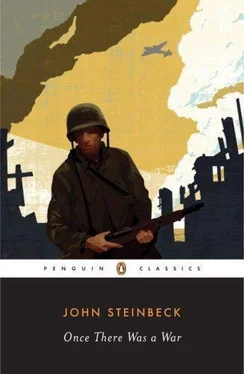John Steinbeck - Once there was a war
Здесь есть возможность читать онлайн «John Steinbeck - Once there was a war» весь текст электронной книги совершенно бесплатно (целиком полную версию без сокращений). В некоторых случаях можно слушать аудио, скачать через торрент в формате fb2 и присутствует краткое содержание. Город: New York, Год выпуска: 1960, Издательство: Bantam Books, Жанр: Классическая проза, на английском языке. Описание произведения, (предисловие) а так же отзывы посетителей доступны на портале библиотеки ЛибКат.
- Название:Once there was a war
- Автор:
- Издательство:Bantam Books
- Жанр:
- Год:1960
- Город:New York
- ISBN:нет данных
- Рейтинг книги:3 / 5. Голосов: 1
-
Избранное:Добавить в избранное
- Отзывы:
-
Ваша оценка:
- 60
- 1
- 2
- 3
- 4
- 5
Once there was a war: краткое содержание, описание и аннотация
Предлагаем к чтению аннотацию, описание, краткое содержание или предисловие (зависит от того, что написал сам автор книги «Once there was a war»). Если вы не нашли необходимую информацию о книге — напишите в комментариях, мы постараемся отыскать её.
Once there was a war — читать онлайн бесплатно полную книгу (весь текст) целиком
Ниже представлен текст книги, разбитый по страницам. Система сохранения места последней прочитанной страницы, позволяет с удобством читать онлайн бесплатно книгу «Once there was a war», без необходимости каждый раз заново искать на чём Вы остановились. Поставьте закладку, и сможете в любой момент перейти на страницу, на которой закончили чтение.
Интервал:
Закладка:
The captain was dressed in a bathing suit and he was barefooted. The First had a rubber coat on but his trousers were rolled up and his feet were bare, too. The two of them looked off across the port torpedo tube at the floating body.
“Should we go over and take a look?” the First said.
“Not in the shape it’s in,” the captain said. “Besides, we have to make our schedule.”
The first said, “I think that’s the loneliest thing in the world. A body floating at sea. I don’t know anything that looks so alone.”
The captain let go his hold on the torpedo tube and turned and held onto the rail behind the port gun turret. “Before you came on I had one that gave me the willies,” he said. He broke abruptly into his story.
“After Palermo fell,” he said, “there was a night and a part of a day before the Seventh Army got to the city. I was on patrol with five PTs and we got the flash and we were in the neighborhood anyway, so we came to take a look. You know what Palermo looks like. That great, big, strong mountain right beside the city and the crazy lights that get on it and then the city spilled down there at the base. It looks like Ulysses has just left there. You can really get the sense of Virgil from that mountain, from the whole northern coast of Sicily, for that matter. It just stinks of the classics.
“Anyway, it was fairly late in the afternoon when we came opposite the city and crept in next to the mole and sneaked through. We were fixed to run if anything shot at us, but nothing did. We went into the harbor and it was really shot to pieces. There were ships sunk all over and twisted cranes and one little Italian destroyer lying over on its side.
“The Air Force really did a job on the waterfront there. Buildings and docks and machinery and boats just blasted into junk. What a junkman’s dream that was! What made me think of it was that the water was oily from the blasted ships and there was a dead woman floating on the oily water, face down and with her hair fanned out and floating behind her. She bobbed up and down when our wake spread out in the harbor.
“At first,” the captain said, “I didn’t know what gave me a queer feeling and then it came to me. There wasn’t anybody moving about on the shore at all. You take a wrecked city, why, there’s usually someone poking around. But not here. I got the idea I’d like to go ashore. So the First I had then and I, we pulled up between two wrecked fishing boats and we got out a tommy gun apiece and we tied up and jumped ashore.
“It’s kind of hard to imagine. Palermo is a pretty big city. Except for the harbor and the waterfront, our bombers hadn’t hurt it very much. Oh, there were some wrecks, but not to amount to anything. I tell you, there wasn’t one living soul in that city. The population moved right out into the hills and the troops hadn’t come yet. There wasn’t a soul.
“You’d walk up a street where there were big houses and the doors would be open and — just not anybody. I did see a cat go streaking across the street, a pure white cat, but that’s the only living thing there was.
“You know those little painted carts the Sicilians have, with scenes painted on them? Well, there were some of those lying on their sides and the donkeys that pulled them were lying there dead, too.
“The First and I walked up into the town. Every once in a while I’d get the idea of going into one of the houses and just seeing what they were like, but I couldn’t. It was quiet and there wasn’t a breath of wind and the doors were open and I just couldn’t make myself go into one of those houses.
“We’d walked quite a good distance up into the town, farther than we thought, when it began to get dark. Neither of us had thought to bring a flashlight. Well, when we saw the dark coming, I think we both got panicky without any reason. We started to walk back to the waterfront and we kept going faster and faster and then we finally broke into a run.
“There was something about that town that didn’t want us there after dark. The open doors were black already and the deep shadows were falling. We dog-trotted through the narrow streets and then I got to thinking — there’s nobody here, but now if I see anybody it’s going to scare me. It gets dark awfully quick there. It was pitch black in the narrow streets, but you could see light above the houses.
“It got so we were really running and when we broke out on the dock and climbed over the wrecks, we were panting. The First said to me, ‘A guy might have got lost in there and not got back all night.’ But he knew we had been scared, and I knew it too.”
A hard dash of spray came over the bow of the PT and splashed him in the face.
“That gave me the willies,” the captain said. “I think that scared me more than I’ve been scared for a long time. I got to thinking about it and once or twice I had a dream about it. Come to think of it, the whole thing was like a dream anyway, from that dead woman right on through. But if I ever wanted to say how it was to be alone and panicky, I think I’d think of that right away.”
SOUVENIR
SOMEWHERE IN THE MEDITERRANEAN WAR THEATER, October 12, 1943 —
It is said, and with some truth, that while the Germans fight for world domination and the English for the defense of England, the Americans fight for souvenirs. This may not be the final end for our dogfaces, but it helps. It is estimated that two divisions of American troops could carry away the Great Pyramid, chip by chip, in twenty-four hours. This writer has seen pup tents piled nearly to the ridge rope with nearly valueless mementos of places the soldiers occupied. Dark back rooms of houses in Algeria and Palermo and Messina, and by now probably Salerno, are roaring with the industry of making bits of colored cloth and celluloid into gadgets to sell the soldiers.
A soldier has been seen struggling down a street in Palermo carrying a fifty-pound statuette of an angel in plaster of Paris. It was painted blue and pink and had written on its base in gold paint, “Balcome too Palermo.” How he ever expected to get it home no one will ever know. If the homes of America ever receive the souvenirs that are being collected by our troops there will be no room for living. The post office at an African station recently stopped a sentimental present a soldier was sending his wife. It was a prized possession and he had bought it from a Goum for 1000 francs. It was a quart jar of fingers pickled in brandy.
It is reported that the pre-Roman Greek temples at Salerno have suffered more from chipping by American soldiers in two weeks than they did during the preceding three thousand years, and whereas they have suffered the destructive rage of invaders for centuries they are not expected to survive the admiring souvenir-hunting of our troops, who only want to send a small chip home to the little woman.
True souvenir-hunting has its rules. It does not apply to the fighter group who transported a grand piano, piece by piece, over a thousand miles. Nor to the bomber swing band who rescued a crushed bull fiddle and mended it with airplane fix-it until it was four inches thick. They wanted to use these things. Souvenir hunting, if properly done, only takes notice of things that can’t possibly be used for anything at all and are too big or too fragile ever to get home.
Probably the greatest souvenir hunter of this whole war is a private first class who must be nameless but is generally called Bugs.
Bugs, when the battle for Gela in Sicily had abated, was poking about among the ruins, when he came upon a mirror — but such a mirror as to amaze him. It had survived bombing and shellfire in some miraculous manner, a matter which created wonder in Bugs. The mirror was six feet two in height and four feet wide, and it was in a frame of carved and painted wood which represented hundreds of small cupids wrestling and writhing about a length of blue ribbon, which accidentally managed to cover every cupid from indecency. The whole thing must have weighed about seventy-five pounds, and it was so beautiful that it broke Bug’s heart. He just couldn’t leave it behind.
Читать дальшеИнтервал:
Закладка:
Похожие книги на «Once there was a war»
Представляем Вашему вниманию похожие книги на «Once there was a war» списком для выбора. Мы отобрали схожую по названию и смыслу литературу в надежде предоставить читателям больше вариантов отыскать новые, интересные, ещё непрочитанные произведения.
Обсуждение, отзывы о книге «Once there was a war» и просто собственные мнения читателей. Оставьте ваши комментарии, напишите, что Вы думаете о произведении, его смысле или главных героях. Укажите что конкретно понравилось, а что нет, и почему Вы так считаете.









